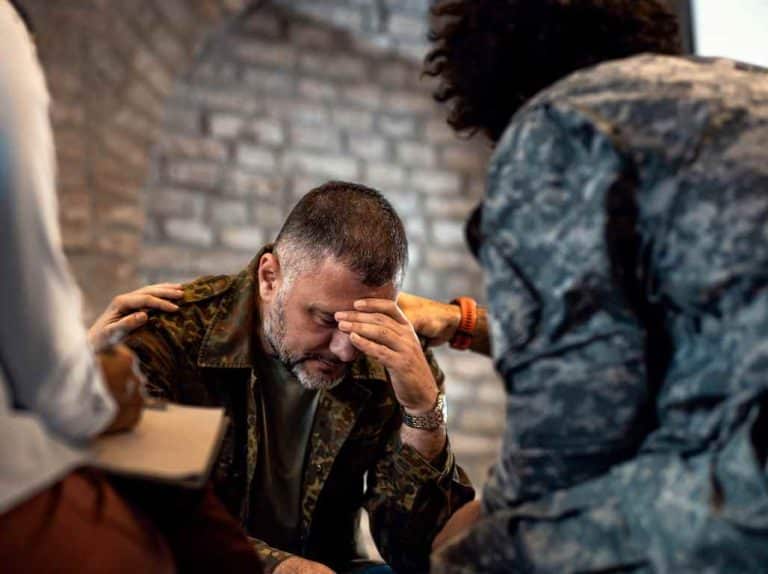PTSD Treatments Are Not One Type Fits All
Post-Traumatic Stress Disorder, or PTSD, is a disorder that between 11-20% of veterans and military personnel may experience due to witnessing a traumatic, in-service event. You may not experience symptoms of PTSD for days, weeks, months, or years after witnessing the traumatic event.
The first step to healing PTSD is seeking treatment. Many veterans who have PTSD refuse to seek treatment largely due to the stigma surrounding PTSD as well as uncertainty regarding what treatment looks like.
In this article, we will break down what to expect during PTSD treatment to relieve any fears and combat the internalized stigma you may face. We hope that after reading this article, you will understand techniques to work through your PTSD symptoms and seek treatment for your PTSD!
What is PTSD Treatment
PTSD treatment consists of various psychological and therapeutic methods designed to target the root cause of PTSD – residual feelings surrounding the traumatic event – and give the person suffering tools and techniques to cope with those feelings and any triggers they may encounter in the future.
Doctors and psychologists may sometimes opt to use the medication in combination with psychological treatment methods. PTSD treatment is completely personal between you and your provider, and it may take several tries to find the right treatment professional and treatment methods that work for you.
Types of PTSD Treatments
As we mentioned above, there are a variety of psychological and therapeutic methods that are used to treat PTSD. Some of the most popular methods include the following:
Cognitive Behavioral Therapy
In Cognitive Behavioral Therapy, you’ll work hard to change how your brain thinks and processes. You’ll also develop a deep understanding of your feelings and why they crop up in certain situations.
Eye Movement Desensitization and Processing
Eye Movement Desensitization and Processing brings traumatic memories to the forefront and assists your brain in developing new patterns and associations with the traumatic event. There is a three-pronged approach used in this type of therapy.
The first prong is recalling the traumatic event and creating new associations. The second prong is identifying situations that bring feelings of distress to the surface and desensitize you to those triggers. The third and final prong assists you in developing skills to tackle future triggering events.
Talk Therapy
Just as it sounds, talk therapy is processing your feelings aloud. During talk therapy, you will participate in a personal session between you and a therapist specializing in PTSD therapy. Talk therapy is a safe space to discuss your thoughts and feelings and develop tools and techniques to work through your PTSD symptoms.
Talk therapy can be the most intimidating type of therapy to start. It may take several sessions before you are truly comfortable sharing your feelings, which is okay! Your provider will walk you through talking about your feelings out loud.
Group Therapy
Group therapy is another form of talk therapy, but instead of one on one therapy, you are surrounded by a group of individuals who have experienced similar events. This therapy allows you to collaboratively share feelings and thoughts, build community, and find healing amongst others who know what you’re going through.
Family Therapy
Healing from PTSD doesn’t only affect you. It affects your family and loved ones. Family Therapy allows you and your family to work through your PTSD symptoms together while giving your family and loved ones tools to support you during your recovery journey.
Getting to PTSD Treatment
Part of getting to the treatment phase of PTSD is, first, going through an assessment to determine if PTSD treatment is right for you. A licensed professional will run tests to diagnose your symptoms.
The Department of Veteran Affairs can connect you with a professional to start you on the road to recovery. These assessments usually take the form of one-on-one sessions with a licensed professional. After an assessment, your provider may recommend a combination of therapies and medication to start your recovery journey.
If you have PTSD due to a service-connected event, you may be eligible to receive disability compensation and additional benefits from the Department of Veterans Affairs. Reach out to your local VA office to start the process.
We hope this article gave you insight into what to expect when undergoing PTSD treatment. The first step in tackling your PTSD is getting help. There is nothing wrong with asking for help and improving your quality of life by tackling your PTSD head-on.
More Articles to Read about PTSD
Children of Alcoholics Have PTSD
PTSD Relief At Home From Trauma Expert Dr. Kate Truitt





















